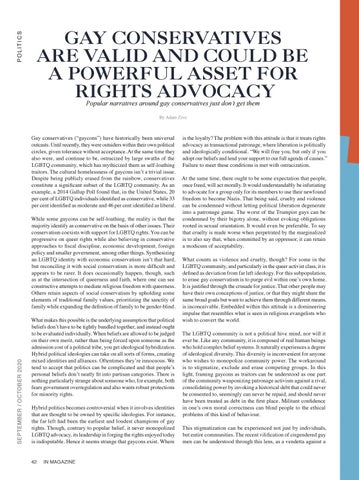POLITICS
GAY CONSERVATIVES ARE VALID AND COULD BE A POWERFUL ASSET FOR RIGHTS ADVOCACY Popular narratives around gay conservatives just don’t get them By Adam Zivo
Gay conservatives (“gaycons”) have historically been universal outcasts. Until recently, they were outsiders within their own political circles, given tolerance without acceptance. At the same time they also were, and continue to be, ostracized by large swaths of the LGBTQ community, which has mythicized them as self-loathing traitors. The cultural homelessness of gaycons isn’t a trivial issue. Despite being publicly erased from the rainbow, conservatives constitute a significant subset of the LGBTQ community. As an example, a 2014 Gallup Poll found that, in the United States, 20 per cent of LGBTQ individuals identified as conservative, while 33 per cent identified as moderate and 46 per cent identified as liberal.
SEPTEMBER / OCTOBER 2020
While some gaycons can be self-loathing, the reality is that the majority identify as conservative on the basis of other issues. Their conservatism coexists with support for LGBTQ rights. You can be progressive on queer rights while also believing in conservative approaches to fiscal discipline, economic development, foreign policy and smaller government, among other things. Synthesizing an LGBTQ identity with economic conservatism isn’t that hard, but reconciling it with social conservatism is more difficult and appears to be rarer. It does occasionally happen, though, such as at the intersection of queerness and faith, where one can see constructive attempts to mediate religious freedom with queerness. Others retain aspects of social conservatism by upholding some elements of traditional family values, prioritizing the sanctity of family while expanding the definition of family to be gender-blind. What makes this possible is the underlying assumption that political beliefs don’t have to be tightly bundled together, and instead ought to be evaluated individually. When beliefs are allowed to be judged on their own merit, rather than being forced upon someone as the admission cost of a political tribe, you get ideological hybridization. Hybrid political ideologies can take on all sorts of forms, creating mixed identities and alliances. Oftentimes they’re innocuous. We tend to accept that politics can be complicated and that people’s personal beliefs don’t neatly fit into partisan categories. There is nothing particularly strange about someone who, for example, both fears government overregulation and also wants robust protections for minority rights. Hybrid politics becomes controversial when it involves identities that are thought to be owned by specific ideologies. For instance, the far left had been the earliest and loudest champions of gay rights. Though, contrary to popular belief, it never monopolized LGBTQ advocacy, its leadership in forging the rights enjoyed today is indisputable. Hence it seems strange that gaycons exist. Where 42
IN MAGAZINE
is the loyalty? The problem with this attitude is that it treats rights advocacy as transactional patronage, where liberation is politically and ideologically conditional. “We will free you, but only if you adopt our beliefs and lend your support to our full agenda of causes.” Failure to meet these conditions is met with ostracization. At the same time, there ought to be some expectation that people, once freed, will act morally. It would understandably be infuriating to advocate for a group only for its members to use their newfound freedom to become Nazis. That being said, cruelty and violence can be condemned without letting political liberation degenerate into a patronage game. The worst of the Trumpist gays can be condemned by their bigotry alone, without evoking obligations rooted in sexual orientation. It would even be preferable. To say that cruelty is made worse when perpetrated by the marginalized is to also say that, when committed by an oppressor, it can retain a modicum of acceptability. What counts as violence and cruelty, though? For some in the LGBTQ community, and particularly in the queer activist class, it is defined as deviation from far left ideology. For this subpopulation, to erase gay conservatism is to purge evil within one’s own home. It is justified through the crusade for justice. That other people may have their own conceptions of justice, or that they might share the same broad goals but want to achieve them through different means, is inconceivable. Embedded within this attitude is a domineering impulse that resembles what is seen in religious evangelists who wish to convert the world. The LGBTQ community is not a political hive mind, nor will it ever be. Like any community, it is composed of real human beings who hold complex belief systems. It naturally experiences a degree of ideological diversity. This diversity is inconvenient for anyone who wishes to monopolize community power. The workaround is to stigmatize, exclude and erase competing groups. In this light, framing gaycons as traitors can be understood as one part of the community weaponizing patronage activism against a rival, consolidating power by invoking a historical debt that could never be consented to, seemingly can never be repaid, and should never have been treated as debt in the first place. Militant confidence in one’s own moral correctness can blind people to the ethical problems of this kind of behaviour. This stigmatization can be experienced not just by individuals, but entire communities. The recent vilification of cisgendered gay men can be understood through this lens, as a vendetta against a















